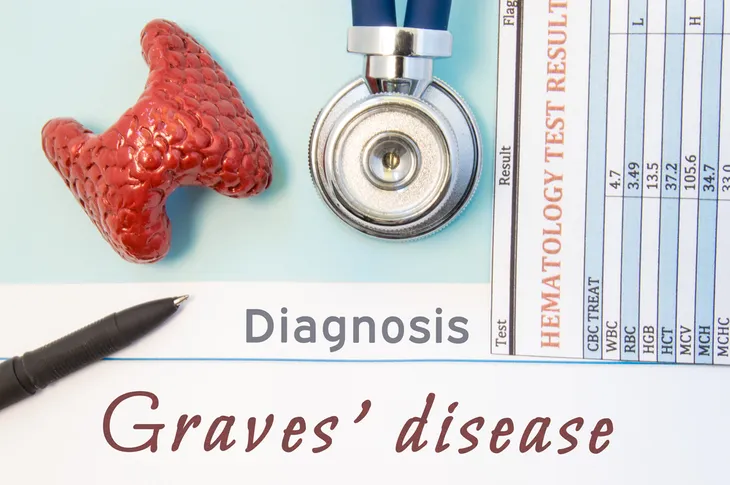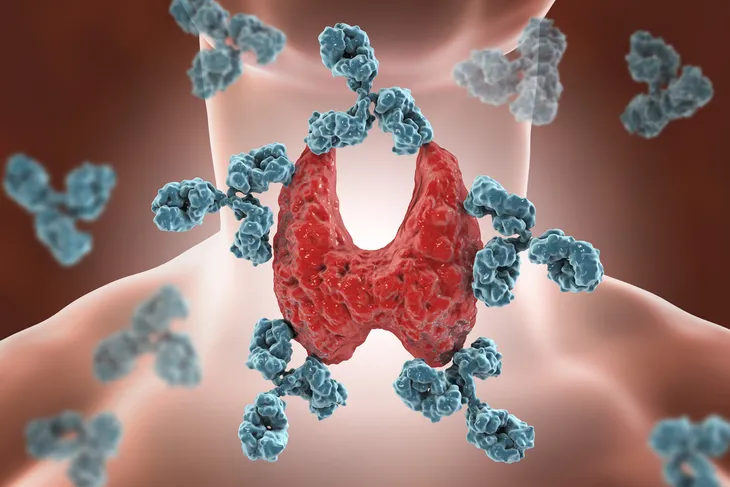A goiter is a condition that people don’t want, as it actually causes enlargement of your thyroid gland, which manifests as swelling of your neck. Along with the enlarged gland, there are a number of other possible symptoms that accompany goiter.
While a goiter is not usually dangerous or painful, it can still sometimes interfere with certain bodily functions (e.g., swallowing). As a result, your doctor may want to investigate the situation further for possible treatment. Let’s take a look at 14 things to know about goiter…
Defining a Goiter
As we noted, a goiter is the enlargement of your thyroid gland, which is located at the base of your neck and is responsible for a number of bodily functions. The enlargement of this important gland will also be visible as swelling of the neck in some cases, while in other cases, it won’t be noticeable, explains the Mayo Clinic.
There are various reasons you may develop a goiter, and one of them is a lack of iodine in the diet, although that’s not a big problem in the U.S. (as iodine is added to salt).
Goiter Symptoms
The symptoms of a goiter can vary depending on the size and severity, and some goiters may not have any symptoms at all, explains the Mayo Clinic.
Possible symptoms include the telltale swelling of the base of the neck, a feeling of tightness in your throat, hoarseness, difficulty swallowing, and possible difficulty breathing.
Possible Complications
The Mayo Clinic says that while smaller goiters aren’t usually a major concern from a health perspective, however, larger goiters that interfere with breathing and swallowing (in rare cases) will obviously have some negative impacts.
Goiters that result from certain conditions (which we’ll cover) can result in additional alarming symptoms such as fatigue, rapid weight loss, and trouble sleeping.
Causes of a Goiter
Again, your thyroid gland, which is linked to your body’s metabolism, can swell for a number of reasons. The Mayo Clinic says these reasons include a lack of iodine (which is common in some places in the world), as well as Graves’ disease, a condition that causes too much thyroid hormone to be produced.
Other possible causes of a goiter include Hashimoto’s disease, which results in an underactive thyroid (hypothyroidism), thyroid cancer, pregnancy (as a result of the production of a hormone called human chorionic gonadotropin), and inflammation (thyroiditis).
Cause: Iodine Deficiency
WebMD explains that lack of iodine in the diet was a leading cause of goiters in the U.S. prior to the 1920s, when iodized salt was first introduced in the country.
Because of this move, goiters caused by a lack of iodine are now rare in the U.S., it adds. Iodine appears in salt and other foods. There’s also the possibility the foods you’re eating are interfering with iodine production, which we’ll cover next.
Cause: Eating “Goiter-Promoting” Foods
This cause of goiter is not from lack of iodine but rather from eating foods that can interfere with the metabolism of the thyroid gland, explains WebMD. The resulting growth, called a sporadic goiter, can result if you consume too many “goiter-promoting foods.”
These foods include soybeans, cabbage, peaches, peanuts, and spinach, it explains. However, this doesn’t mean you should arbitrarily cut these foods from your diet. “Keep in mind you would have to eat huge amounts of these foods to cause a goiter,” adds the source.
Cause: Graves’ Disease
Healthline.com lists Graves’ disease as one of the possible causes of a goiter. But, what is this disease exactly? The source says this is an autoimmune disorder (when the body attacks its own healthy tissues and cells), and results in your thyroid producing too much thyroid hormone (hyperthyroidism).
This is actually one of the most common reasons for hyperthyroidism, which itself can lead to symptoms (such as weight loss, emotional problems, and fatigue).
Cause: Hashimoto’s Disease
Also called Hashimoto’s thyroiditis or chronic lymphocytic thyroiditis, this condition is a more common cause of goiter than lack of iodine in the U.S., explains the American Thyroid Association. This is also an autoimmune condition that damages the thyroid, rendering it unable to produce adequate thyroid hormone.
This triggers your pituitary gland (in your brain) to send out more thyroid-stimulating hormone to make up for the lack of supply, which can, in turn, cause your thyroid to swell.
Cause: Nodules
The Mayo Clinic says there are two possible variations of this problem, multinodular goiters, and solitary thyroid nodules. In the case of multinodular goiters, several “solid or fluid-filled lumps” develop on the thyroid and cause the gland to appear larger.
In the case of solitary thyroid nodules, as the name suggests only one nodule develops in one area of the gland, and the source assures they are usually non-cancerous.
Cause: Thyroid Cancer
This form of cancer can cause the thyroid gland to enlarge, so it’s safe to say that anything that causes a goiter should be checked to rule out serious underlying causes such as cancer. A thyroid tumor feels like a lump in the neck, explains Livestrong.com.
It’s also important to keep in mind that a tumor is not necessarily cancerous. There are various types of thyroid cancer, with the most common being papillary thyroid cancer, which develops slowly and usually only appears only one of the two lobes of the thyroid gland.
Cause: Pregnancy
EndocrineWeb.com says an underactive or overactive thyroid gland is quite common during pregnancy, as human chorionic gonadotropin (a pregnancy-related hormone) can spike thyroid hormone production. The source notes thyroid hormones are particularly important in fetal development during the first 3-months before the fetus begins producing its own thyroid hormones.
The source says that thyroid diseases during pregnancy can be particularly alarming as they can lead to premature birth, preeclampsia (a dangerous rise in blood pressure), low birth weight, and other issues. Talk to your doctor if you’ve had a history of thyroid issues, so they’ll be on the lookout during pregnancy, suggests the source.
Treating Goiters With Medication
The Mayo Clinic explains that goiters from hypothyroidism can be treated with a thyroid hormone replacement medication called levothyroxine, and this approach can often relieve the associated symptoms and shrink the size of your goiter.
If the goiter is caused by inflammation, you may be able to use an over-the-counter remedy such as aspirin, or a corticosteroid medication, and in the case of hyperthyroidism, there are medications that can help regulate hormone levels and consequently symptoms.
Treating Goiters With Radioactive Iodine
In some cases, radioactive iodine can be an option to calm an overactive thyroid gland that is causing a goiter. This remedy is administered orally and destroys thyroid cells.
The end result is a reduction in the size of the goiter. But, treatment needs to be monitored closely, as it can also result in an underactive thyroid.
Surgery As An Option
If your goiter is unusually large or is interfering with eating or breathing or if you have a nodular goiter, the doctor may recommend surgery, according to the Mayo Clinic.
This involves removing a section or all of your thyroid (known as a total or partial thyroidectomy), which is also an approach if you have thyroid cancer. As the removal of the gland will mean less hormone production, you may need to take a hormone replacement medication after the procedure.

















